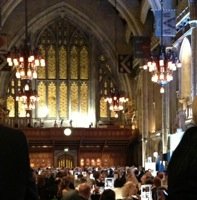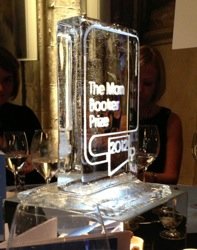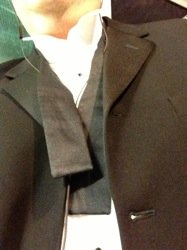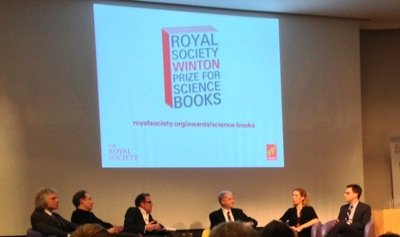Over the last couple of months, I’ve managed invites to a few swish literary shindigs.

For no literary reason at all (I’m the proud godparent of someone who works for the prize’s sponsors), I was able to make my way into this year’s ceremony for the Man Booker Prize, held in the rather splendid Guildhall in the City of London. (That’s the hall at right, being addressed I think by the chairman of the Booker Prize Committee, Sir Peter Stothard).
This year’s winner was Hilary Mantel for Bring Up the Bodies, the second volume in her fictionalisation of the life of Thomas Cromwell. I admit I haven’t read that, nor its also-prizewinning predecessor Wolf Hall (nor in fact any of the rest of this year’s crop). And I was sort of hoping to hear Will Self give a speech or, better, a rant.
The ice sculptures at the center of even our low-rent table on the outskirts was evidence of the luxury of the event, as was the remnant of my outfit (why else wear a bow tie unless you can flaunt the louche look at the end of the evening? Although alas the picture wasn’t taken on my ride home in an appropriate chauffeured limo, nor even a black cab, but the Central Line on the London Underground…).


Slightly closer to my usual bailiwick, earlier this week I went to see the award of this year’s Royal Society Winton Prize for Science Books, organised by Britain’s Royal Society, and sponsored by Winton Capital:

Those are shortlisted authors Steven Pinker, Brian Greene, host/comedian (and former Cambridge physics PhD student) Ben Miller, James Gleick, Lone Frank and Joshua Foer. Again, I’m behind on this year’s selections, and enjoyed all of the authors’ readings — though I found Foer’s bit from his Moonwalking with Einstein especially compelling. But Gleick’s The Information triumphed (and his previous books, from Chaos to his biography of Richard Feynman, have shown him to be an excellent writer and communicator, so I am sure it was well-deserved).
After the award, standing around the Royal Society’s digs, swigging the obligatory (and appreciated) champagne, we realised something strange about this year’s shortlist: no British authors. One Dane (Lone Frank) and five Americans (the fifth, Nathan Wolfe, couldn’t make it).
This has re-inspired me to go to the next level up from these monthly posts (and more frequent tweets) and think about writing that book that they say we all have in us. Let’s try a little crowdsourcing: what book should I write?